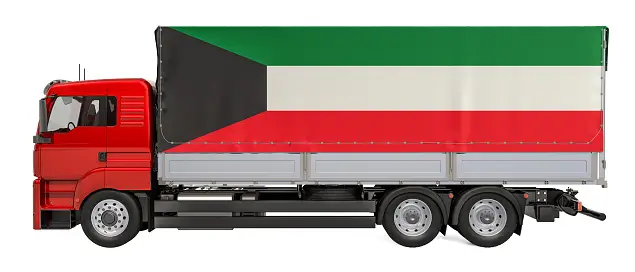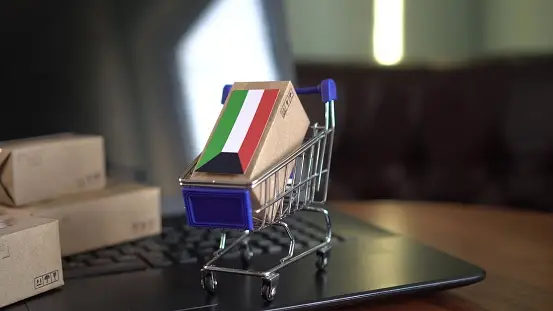Introduction
In the heart of the Arabian Peninsula, Kuwait's logistics sector stands at the forefront of transformative advancements and innovations. This article explores the dynamic landscape of the Kuwait Logistics Sector, highlighting the technological advancements, challenges faced, future outlook of the Kuwait's logistics sector and delves deep into the strides made to enhance supply chains through cutting-edge technologies and innovative practices.
Unveiling Technological Advancements

Integration of Smart Technologies
Kuwait's logistics sector is undergoing a profound transformation through the integration of smart technologies. From IoT-enabled tracking systems to AI-driven analytics, these technologies optimize every facet of the supply chain, offering real-time insights, improving efficiency, and ensuring the seamless flow of goods.
Real-time Tracking Systems
At the heart of Kuwait's logistics evolution is the integration of Internet of Things (IoT) technologies. Real-time tracking systems provide unparalleled visibility into the movement of goods, enabling logistics providers to enhance efficiency, reduce costs, and ensure the seamless flow of products throughout the supply chain.
AI Analytics for Precision
Artificial Intelligence (AI) is the driving force behind advanced analytics in Kuwait's logistics sector. AI algorithms process vast datasets, offering predictive insights that revolutionize demand forecasting, inventory management, and operational decision-making. This infusion of AI ensures a proactive and data-driven approach to logistics management.
Robotics Redefining Operations
Warehousing in Kuwait undergoes a paradigm shift with the introduction of robotics. Automated systems are revolutionizing inventory management, accelerating order fulfilment, and reducing errors. Robotics not only enhance operational efficiency but also contribute to cost savings and increased precision.
Agile Distribution Networks
Automation extends to distribution processes, ushering in agile systems. From automated sorting to robotic order fulfilment, Kuwait's logistics sector embraces these innovations to streamline processes, reduce turnaround times, and enhance the overall responsiveness of distribution networks.
Innovation in Last-Mile Delivery

Drones
Swift Urban Deliveries
Kuwait's last-mile delivery challenges, particularly in congested urban areas, are met head-on with the deployment of drones. These unmanned aerial vehicles navigate traffic seamlessly, ensuring swift deliveries to doorsteps. This innovation not only accelerates the delivery process but also offers a solution to the logistical challenges posed by densely populated city centers.
Precision and Efficiency
Drones bring precision to last-mile delivery by taking direct routes, bypassing traffic bottlenecks. With the ability to cover short distances quickly, they enhance the efficiency of deliveries, reducing transit times and improving overall customer satisfaction. Kuwait embraces this technology to redefine the speed and reliability of the final mile.
Autonomous Vehicles
Driverless Deliveries
Autonomous vehicles are becoming integral to Kuwait's last-mile delivery strategy. These driverless vehicles navigate through predetermined routes with precision, ensuring secure and timely deliveries. By reducing dependence on human drivers, Kuwait aims to enhance the reliability and safety of the last leg of the delivery journey.
Overcoming Traffic Challenges
In a country where traffic congestion is a common concern, autonomous vehicles present a promising solution. These vehicles use advanced sensors and navigation systems to adapt to the dynamic traffic conditions of Kuwait's urban areas, ensuring deliveries reach their destinations efficiently.
Integration with E-commerce
Aligning with E-commerce Trends
Kuwait's last-mile delivery innovations seamlessly integrate with the rising tide of e-commerce. As online shopping becomes increasingly popular, logistics providers in Kuwait are adapting their last-mile strategies to meet the unique demands of e-commerce customers, ensuring timely and convenient deliveries of online purchases.
E-commerce Fulfilment Centers
To cater specifically to the needs of online shoppers, Kuwait is establishing dedicated e-commerce fulfilment centres strategically located for efficient last-mile deliveries. These centers streamline order processing, packing, and dispatch, ensuring a swift and streamlined flow of goods from the warehouse to the customer's doorstep.
Sustainable Logistics Practices

Eco-friendly Packaging Initiatives
Reducing Environmental Impact
Kuwait's logistics sector is actively addressing environmental concerns by adopting eco-friendly packaging initiatives. From biodegradable materials to innovative packaging designs, the sector is taking steps to reduce waste and minimise its environmental impact. These sustainable packaging practices align with global efforts towards a more eco-conscious approach to logistics.
Enhancing Brand Reputation
Beyond the environmental benefits, adopting eco-friendly packaging enhances the brand reputation of logistics providers in Kuwait. Demonstrating a commitment to sustainability resonates positively with consumers, contributing to a positive brand image and fostering customer loyalty.
Energy-efficient Transportation
Transition to Electric and Hybrid Vehicles
Kuwait's logistics sector is embracing energy-efficient transportation modes, such as electric and hybrid vehicles. This transition not only reduces the carbon footprint of logistics operations but also aligns with global initiatives to create more sustainable and environmentally friendly supply chains.
Lowering Operational Costs
In addition to the environmental benefits, the adoption of energy-efficient transportation contributes to lowering operational costs for logistics providers. Electric and hybrid vehicles often have lower maintenance costs and benefit from government incentives, making them a financially viable and environmentally responsible choice.
Green Initiatives in Warehousing
Sustainable Warehousing Practices
Warehousing in Kuwait undergoes a transformation with the implementation of green initiatives. Logistics providers are incorporating sustainable practices such as energy-efficient lighting, waste reduction strategies, and eco-friendly building materials. These initiatives contribute to creating environmentally responsible warehousing solutions.
Optimizing Resource Utilization
Sustainable warehousing practices extend to optimizing resource utilization. Automated systems and advanced technologies are employed to ensure efficient use of space, reduce energy consumption, and minimise waste. These initiatives align with Kuwait's commitment to creating a logistics sector that is both innovative and environmentally conscious.
Collaborative Sustainability Networks
Synergies Across the Supply Chain
Kuwait's logistics sector recognizes the importance of collaboration for sustainable practices. Collaborative sustainability networks bring together logistics providers, retailers, and other stakeholders to share best practices, innovations, and resources. This synergistic approach fosters a collective commitment to sustainability across the entire supply chain.
Driving Industry-wide Change
By actively participating in collaborative sustainability networks, Kuwait aims to drive industry-wide change. The exchange of ideas and initiatives ensures that sustainable practices become integral to the ethos of the logistics sector, creating a lasting impact on the environmental footprint of Kuwait's logistics networks.
Digitalization of Supply Chain Management

Blockchain
Digitalization is a cornerstone of Kuwait's logistics evolution, with blockchain technology playing a pivotal role. Blockchain ensures transparency and traceability throughout the supply chain, from the origin of goods to the end-user. This not only mitigates risks but also instils confidence in consumers and stakeholders.
Predictive Analytics for Demand Forecasting
The implementation of predictive analytics in supply chain management enables Kuwait's logistics sector to forecast demand accurately. This proactive approach minimizes overstocking or understocking issues, streamlining operations and ensuring that resources are optimally allocated.
Read More: Smart Cities In Kuwait: Revolutionizing Urban Living Through Blockchain Technology And FinTech
Challenges and Solutions

Traffic Congestion in Urban Deliveries
Urbanization Struggles
Kuwait's urban centers grapple with increasing traffic congestion, posing a significant challenge to last-mile deliveries. The surge in online shopping and the need for swift deliveries exacerbate the issue. Addressing traffic congestion is crucial to ensuring timely and efficient urban deliveries, necessitating innovative solutions and collaborative efforts.
Potential Solutions
To mitigate the impact of traffic congestion, Kuwait's logistics sector is exploring alternative delivery methods such as drones and autonomous vehicles. These technologies aim to navigate through congested urban areas, providing a solution to the challenges posed by traditional delivery modes.
Security Concerns in Last-Mile Deliveries
Protecting Deliveries
As the e-commerce landscape grows, security concerns in last-mile deliveries become more pronounced. The risk of theft or damage to packages during the final leg of the delivery journey poses a challenge to logistics providers. Ensuring the security of delivered goods is paramount to building trust with customers and safeguarding the integrity of the logistics sector.
Advanced Security Measures
Kuwait's logistics sector is responding to security concerns by implementing advanced security measures. Real-time tracking, secure drop-off points, and enhanced authentication methods are being employed to secure deliveries. These measures not only protect packages but also contribute to the reliability and trustworthiness of the logistics network.
Integration Challenges with E-commerce
Meeting E-commerce Demands
The surge in e-commerce activities worldwide presents a challenge for Kuwait's logistics sector to seamlessly integrate with online retail. Meeting the unique demands of e-commerce, including swift deliveries, order tracking, and efficient returns processing, requires a level of integration and adaptability that may pose challenges for traditional logistics systems.
E-commerce Fulfilment Centers
To overcome integration challenges, Kuwait is investing in dedicated e-commerce fulfilment centers. These centers streamline the processing of online orders, ensuring that logistics providers can meet the specific requirements of e-commerce customers. This strategic approach aims to bridge the gap between traditional logistics and the demands of the e-commerce landscape.
Environmental Sustainability
Balancing Growth and Sustainability
While logistics growth is essential, the environmental impact cannot be ignored. Kuwait faces the challenge of balancing the need for efficient logistics with the imperative to adopt sustainable practices. From packaging materials to transportation choices, finding eco-conscious solutions without compromising efficiency poses a delicate challenge for the logistics sector.
Eco-friendly Initiatives
Kuwait's logistics sector is actively addressing sustainability challenges through eco-friendly initiatives. Adopting biodegradable packaging materials, transitioning to energy-efficient transportation, and embracing sustainable warehousing practices are steps taken to minimise the environmental footprint. Striking a balance between growth and sustainability remains a key focus for the industry.
Future Collaborations and Partnerships

International Partnerships
Kuwait's logistics sector is actively seeking international partnerships to expand its reach and capabilities. Collaborations with global logistics giants and technology innovators not only bring in expertise but also open avenues for knowledge exchange, contributing to Kuwait's standing in the global logistics arena.
Collaborative Ecosystems for Innovation
Global Partnerships for Expansion
Kuwait actively seeks global partnerships to expand its logistics capabilities. Collaborations with international logistics giants and technology innovators bring in expertise and foster cross-cultural exchanges. These global alliances position Kuwait as a key player in the interconnected web of global logistics.
Collaborative Logistics Networks
The future of Kuwait's logistics sector lies in collaborative networks. Collaborations between logistics providers, retailers, and technology companies foster innovation, efficiency, and cost-effectiveness. This synergistic approach positions Kuwait as a regional logistics hub, offering integrated solutions to global partners.
Human-centric Approaches for Customer Satisfaction
Personalized Customer Experiences
In the future, Kuwait's logistics sector places a premium on human-centric approaches. Personalized customer experiences, from customized delivery options to responsive customer service, become integral. This customer-focused strategy ensures satisfaction and loyalty in an era where the human touch remains paramount.
Workforce Upskilling and Development
Kuwait's logistics future prioritizes the development of its workforce. Upskilling initiatives ensure that professionals in the industry are equipped with the latest technological and managerial competencies. This investment in human capital fortifies Kuwait's logistics sector for the challenges and opportunities that lie ahead.
Conclusion
In conclusion, the Kuwait Logistics Sector is not just adapting to the winds of change but leading the charge in innovative advancements. While Kuwait's logistics sector faces challenges, it is actively working towards innovative solutions and collaborative efforts. From addressing traffic congestion to ensuring the security of deliveries and embracing sustainability, Kuwait is positioning itself for a resilient and efficient logistics future.
FAQs
Q1: How is Kuwait addressing traffic congestion challenges in last-mile delivery?
A: Kuwait acknowledges the rising issue of traffic congestion, especially in urban areas, affecting last-mile deliveries. To combat this challenge, the logistics sector is exploring alternative delivery methods, such as drones and autonomous vehicles. These innovations aim to navigate through congested areas efficiently, ensuring timely deliveries and mitigating the impact of traffic congestion on logistics operations.
Q2: What measures are in place to ensure the security of delivered goods in Kuwait?
A: Ensuring the security of delivered goods is a paramount concern for Kuwait's logistics sector. Advanced security measures are implemented, including real-time tracking systems, secure drop-off points, and enhanced authentication methods. These measures work together to safeguard deliveries, protect packages from theft or damage, and build trust with customers by ensuring the safe arrival of goods.
Q3: How does Kuwait's logistics sector plan to integrate with the growing demands of e-commerce?
A: Kuwait's logistics sector is actively adapting to the burgeoning demands of e-commerce. The integration involves the establishment of dedicated e-commerce fulfilment centers strategically located for efficient last-mile deliveries. These centres streamline order processing, packing, and dispatch, ensuring a swift and streamlined flow of goods from the warehouse to the customer's doorstep, meeting the specific requirements of online shoppers.
Q4: What eco-friendly initiatives are being implemented to address sustainability challenges in the logistics sector?
A: Kuwait's logistics sector is committed to addressing sustainability challenges through various eco-friendly initiatives. This includes the adoption of biodegradable packaging materials, transitioning to energy-efficient transportation modes like electric and hybrid vehicles, and embracing sustainable warehousing practices. These initiatives aim to reduce the environmental footprint of logistics operations and align with global efforts towards a more eco-conscious approach to logistics.
Q5: How are collaborative networks contributing to the efficiency of Kuwait's logistics sector?
A: Collaborative networks play a crucial role in enhancing the efficiency of Kuwait's logistics sector. These networks bring together logistics providers, retailers, and technology partners to share best practices, innovations, and resources. Through collaborative efforts, Kuwait aims to streamline operations, improve coordination across the supply chain, and collectively address challenges, fostering a more efficient and integrated logistics ecosystem.
Q6: What steps are being taken to balance the growth of logistics with environmental sustainability in Kuwait?
A: Balancing the growth of logistics with environmental sustainability is a key focus for Kuwait. The logistics sector is actively implementing eco-friendly initiatives, including the adoption of sustainable packaging materials, the transition to energy-efficient transportation, and the promotion of green warehousing practices. These steps aim to strike a balance between the need for efficient logistics operations and the imperative to reduce the environmental impact, ensuring a sustainable future for Kuwait's logistics sector.
Tags:
Gulf News